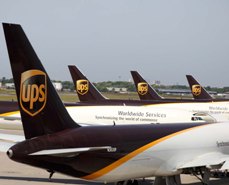UPS is playing down the threat of a strike by its ‘highly paid’ pilots despite a union call for a yes vote next month just ahead of the peak season.
The Independent Pilots Association (IPA), which represents the 2,528 UPS pilots, said yesterday it is urging pilots to authorise a strike following more than four years of fruitless negotiations. The vote result will be announced on October 23.
A yes vote would enable the IPA to withdraw from official mediation which started in early 2014 but has failed to achieve a breakthrough. Industrial action could then follow after a 30-day period under the US Railway Labor Act, which also covers airlines.
IPA president Robert Travis said: “For the past four years, UPS has stalled and delayed, unnecessarily prolonging our negotiations. UPS management has created a bitter standoff with its pilot employees."
The two sides have been in talks since 2011 over a new pay and working conditions contract to replace an agreement which dates back to 2006 and remains valid pending a new agreement. Under that contract, UPS pilots gained significant pay rises and flying guarantees for international routes. Pay details were not disclosed but US media reported at the time that pilots would get an immediate 18% wage increase, followed by annual 3% increases from 2008 onwards and a 4% rise in 2012. There were also guarantees that non-US flights would not be outsourced to non-UPS pilots.
UPS emphasised that it “continues to negotiate in good faith for a contract that is good for our employees, our customers and our company”, and said it is confident the negotiations will be completed without disruption to service.
UPS Airlines spokesman Mike Mangeot said: “Despite the IPA’s announcement, there is no real threat of a strike. Such authorisation votes are routine during negotiations in the airline industry, but they are legally irrelevant under the Railway Labor Act, the U.S. labour law that governs airlines. Under the RLA, a strike is not possible unless authorised by the National Mediation Board. Even then, there are a series of fail-safes, including presidential and congressional intervention, designed to prevent an interruption in operations.”
He added: “We remain committed to rewarding our pilots for their contributions, but we will do so in a responsible manner that allows us to remain competitive.”
Describing its pilots as “the top earners in commercial aviation”, UPS disclosed that captains earn a minimum of $255,128 per year, and typically about $35,000 more. In comparison, the next highest-paid captains (at FedEx) earn $230,379 at guarantee. The average pay for all UPS pilots, including both captains and first officers, is $238,000, which is well ahead of the US commercial airline average of $98,410, according to UPS.
In addition, UPS crewmembers benefit from two company-funded retirement plans and a comprehensive health insurance plan with an annual contribution that costs a third less than what a typical U.S. family, with far lower income, pays.
The escalation of the UPS pilots’ labour dispute comes just weeks before more than 4,000 FedEx pilots are due to vote on a new pay agreement that was sealed between FedEx and the Air Line Pilots Association (ALPA) after a year of negotiations. If ratified, the contract will go into effect in November 2015 and would become amendable in 2021.
The new FedEx pilots’ agreement provides across-the-board increases to hourly pay rates and new-hire compensation, a significant signing bonus that addresses the time elapsed since the agreement was amendable, retirement plan enhancements, and work-rule improvements.












